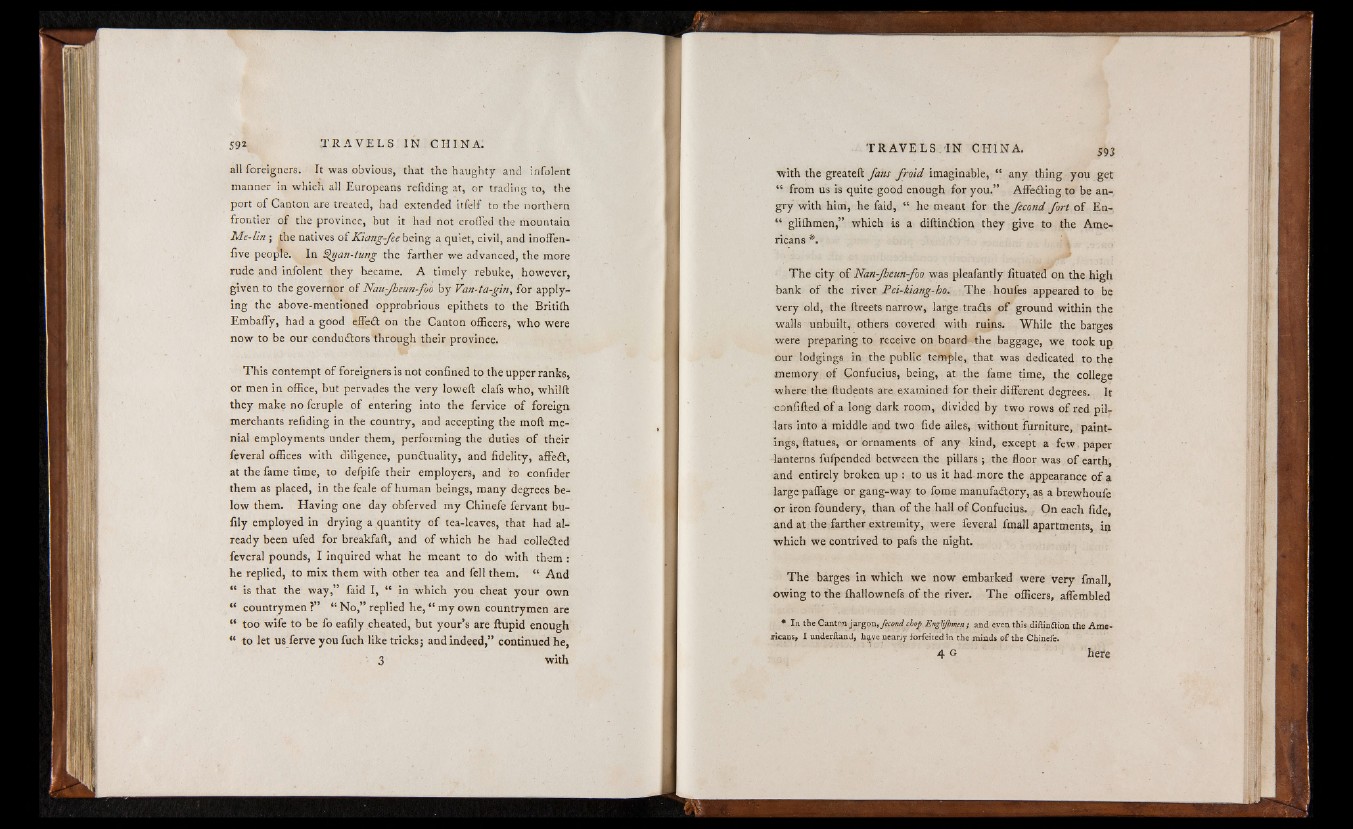
all foreigners. It was obvious, that the haughty and infolent
manner in which all Europeans refiding at, or trading to, the
port o f Canton are treated, had extended itfelf to the northern
frontier o f the province, but it had not eroded the mountain
Me-lin ; the natives o f Kiang-fee being a quiet, civil, and inoffen-
five people. In §>uan-tung the farther we advanced, the more
rude and infolent they became. A timely rebuke, however,
given to the governor o f Nau-Jheun-foo by Van-ta-gin, for applying
the above-mentioned opprobrious epithets to the Britiih
EmbalTy, had a good effeCt on the Canton officers, who were
now to be our conductors through their province.
This contempt o f foreigners is not confined to the upper ranks,
or men in office, but pervades the very loweft clafs who, whilft
they make no fcruple o f entering into the fervice o f foreign
merchants refiding in the country, and accepting the moft menial
employments under them, performing the duties o f their
feveral offices with diligence, punctuality, and fidelity, affeCt,
at the fame time, to defpife their employers, and to confider
them as placed, in the fcale o f human beings, many degrees below
them. Having one day obferved my Chinefe feryant bu-
fily employed in drying a quantity o f tea-leaves, that had already
been ufed for breakfaft, and o f which he had collected
feveral pounds, I inquired what he meant to do with them :
he replied, to mix them with other tea and fell them. “ And
“ is that the way,” faid I, “ in which you cheat your own
“ countrymen?” “ No,” replied he, “ m y own countrymen are
“ too wife to be fo eafily cheated, but your’s are ftupid enough
“ to let us ferve you fuch like tricks; and indeed,” continued he,
3 with
with the greateft fans fr o id imaginable, jg any thing you get
“ from us is quite good enough for you.” AffeCting to be angry
with him, he faid, “ he meant for the fecond fo rt o f En-
“ glifhmen,” which is a diftinCtion they give to the Americans
*.
The city o f Nan-Jheun-foo was pleafantly fituated on the high
bank o f the river Pei-kiang-ho, The houfes appeared to be
very old, the ftreets narrow, large traCls o f ground within the
walls unbuilt, others covered with ruins. While the barges
were preparing to receive on board the baggage, we took up
our lodgings in the public temple, that was dedicated to the
memory o f Confucius, being, at the fame time, the college
where the ftudents are examined for their different degrees. It
-confifted o f a long dark room, divided by two rows o f red pillars
into a middle and two fide ailes, without furniture, paintings,
ftatues, or ornaments o f any kind, except a few paper
lanterns fufpended between the pillars ; the floor was o f earth
and entirely broken up : to us it had more the appearance o f a
large paflage or gang-way to fome manufactory, as a brewhoufe
or iron foundery, than o f the hall o f Confucius. On each fide,
and at the farther extremity, were feveral fmall apartments, in
which we contrived to pafs the night.
The barges in which we now embarked were very fmall,
owing to the fhallownefs o f the river. The officers, aflembled
• In the Canton jargon, fccond chop EngUJbmn; and even this diilmftion the Arne-
xicans, I underftand, have nearly forfeited in the minds o f the Chinefe.
4 ° i here